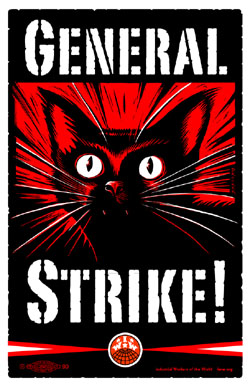Submitted on Sat, 03/26/2011 - 11:49am
 By Diane Krauthamer
By Diane Krauthamer
When public school teacher Kathy Ponzer started protesting state budget cuts in February, she didn’t think she would be igniting a mass labor movement. But when she heard that the state would be taking away her rights and the wages and that she, her three children and her fellow teachers need in order to survive, she knew she had no choice but to fight this battle.
“Most of us make less than $50,000 a year. We’re not living the fat life, we’re just making a living,” she said. Now, Kathy is protesting recently-passed legislation that imposes severe budget cuts and strips workers of collective bargaining rights, amongst other things. “It is going to hurt everybody,” she said.
On March 11, Wisconsin Governor Scott Walker signed into law a “Budget Repair Bill” which strips public-sector unions of collective bargaining rights regarding all workplace issues other than basic wages. With the new legislation, workers will not have a legal say in their pensions, their healthcare plans, workplace safety, or any other issue. Walker says the bill is estimated to save $30 million to help pay down a $137 million budget deficit, but the cuts are being taken directly out of the public sector. Workers, in turn, will be paying off the deficit out of their own pockets.
Walker unveiled his budget repair bill on Feb. 11, 2011. In the days following, unions and public workers mobilized opposition to the bill, and by Feb. 15 large-scale protests took place, with thousands of demonstrators occupying the Capitol and millions more holding solidarity rallies in cities throughout the country. On Feb. 17, the situation escalated as 14 senate Democrats fled to Illinois to block passage of the bill. In order to pass any fiscal-related measure, 20 senators are needed to make quorum, and the remaining eight Republicans could not fit the bill. In the week that followed, massive protests continued with demonstrators and support spreading throughout the world. By Feb. 23, the South Central
Federation of Labor (SCFL), a federation of over 97 labor organizations representing 45,000 workers, endorsed to educate and prepare for a general strike—a resolution which the IWW played a key role in endorsing. As the people of Wisconsin continued to mobilize, so too did the politicians. At 1:00 a.m. on Feb. 25, the Republicans in the state assembly outnumbered the Democrats and abruptly voted to pass the bill, with Democrats and protestors chanting “Shame!” as they exited the chambers. Massive demonstrations followed, yet the remaining senators unanimously passed a resolution finding the missing 14 Democrats in contempt, threatening to layoff and arrest them if they returned back home.